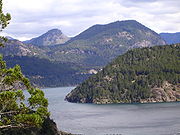Life
Although there is no universal agreement on the definition of life, scientists generally accept that the biological manifestation of life is characterized by organization, metabolism, growth, adaptation, response to stimuli and reproduction। may also be said to be simply the characteristic state of organisms.
Properties common to terrestrial organisms (plants, animals, fungi, protists, archaea and bacteria) are that they are cellular, carbon-and-water-based with complex organization, having a metabolism, a capacity to grow, respond to stimuli, and reproduce. An entity with these properties is generally considered life. However, not every definition of life considers all of these properties to be essential. Human-made analogs of life may also be considered to be life.
The biosphere is the part of Earth's outer shell – including air, land, surface rocks and water – within which life occurs, and which biotic processes in turn alter or transform. From the broadest geophysiological point of view, the biosphere is the global ecological system integrating all living beings and their relationships, including their interaction with the elements of the lithosphere (rocks), hydrosphere (water), and atmosphere (air). Currently the entire Earth contains over 75 billion tons (150 trillion pounds or about 6.8 x 1013 kilograms) of biomass (life), which lives within various environments within the biosphere.
Over nine-tenths of the total biomass on Earth is plant life, on which animal life depends very heavily for its existence. More than 2 million species of plant and animal life have been identified to date, and estimates of the actual number of existing species range from several million to well over 50 million. The number of individual species of life is constantly in some degree of flux, with new species appearing and others ceasing to exist on a continual basis. The total number of species is presently in rapid
copied
Properties common to terrestrial organisms (plants, animals, fungi, protists, archaea and bacteria) are that they are cellular, carbon-and-water-based with complex organization, having a metabolism, a capacity to grow, respond to stimuli, and reproduce. An entity with these properties is generally considered life. However, not every definition of life considers all of these properties to be essential. Human-made analogs of life may also be considered to be life.
The biosphere is the part of Earth's outer shell – including air, land, surface rocks and water – within which life occurs, and which biotic processes in turn alter or transform. From the broadest geophysiological point of view, the biosphere is the global ecological system integrating all living beings and their relationships, including their interaction with the elements of the lithosphere (rocks), hydrosphere (water), and atmosphere (air). Currently the entire Earth contains over 75 billion tons (150 trillion pounds or about 6.8 x 1013 kilograms) of biomass (life), which lives within various environments within the biosphere.
Over nine-tenths of the total biomass on Earth is plant life, on which animal life depends very heavily for its existence. More than 2 million species of plant and animal life have been identified to date, and estimates of the actual number of existing species range from several million to well over 50 million. The number of individual species of life is constantly in some degree of flux, with new species appearing and others ceasing to exist on a continual basis. The total number of species is presently in rapid
copied





